In 1918 some women – 40% – got the vote in national elections in Britain. The organised campaign for women's suffrage started in 1866 with the first petition to Parliament. By the early 1900s there were many suffrage groups for (and against) votes for women. The main image used for Suffrage18 shows women still campaigning for the vote on equal terms with men in 1927. All women over 21 got the vote in 1928.
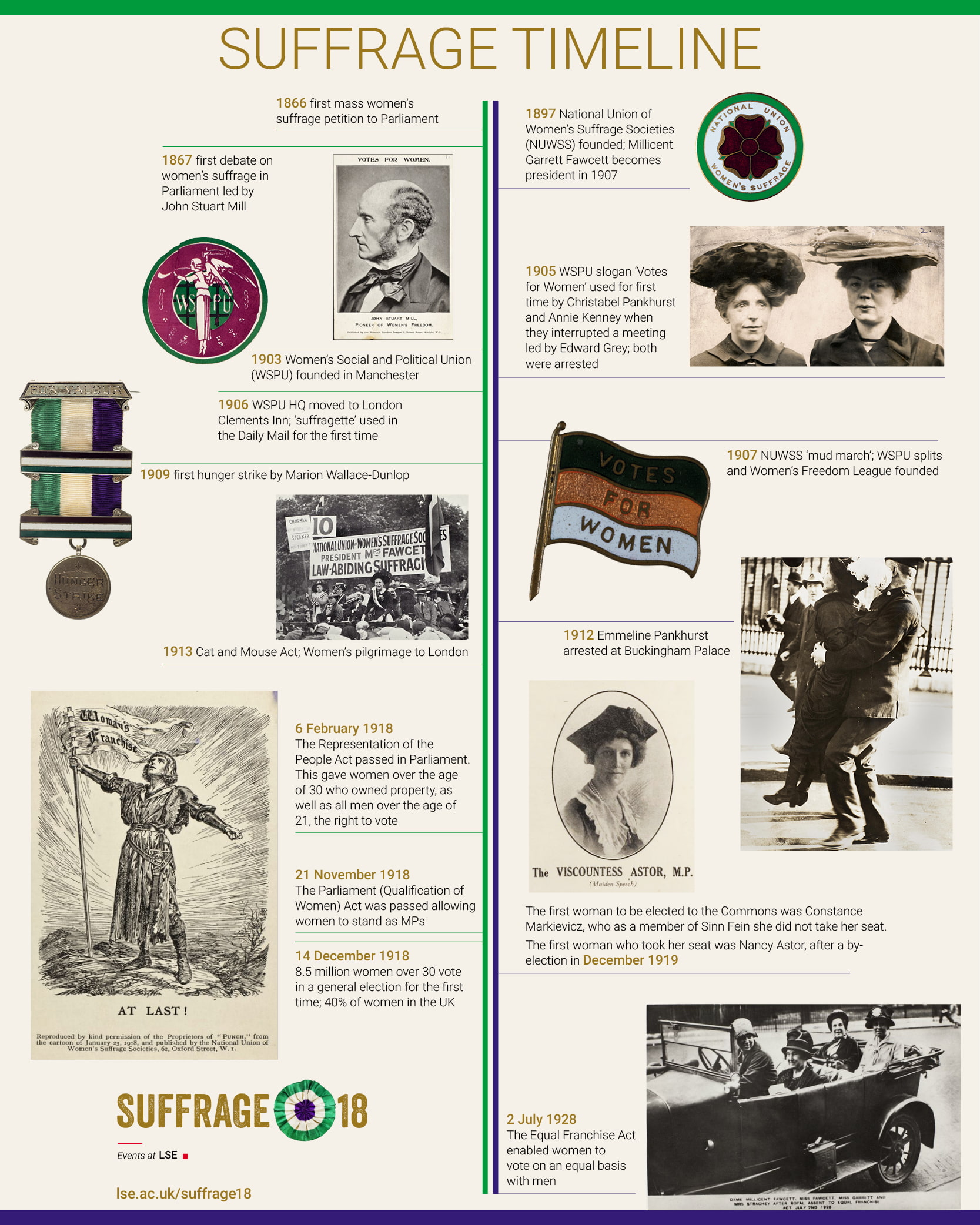 Download our Suffrage Timeline graphic [PDF]
Download our Suffrage Timeline graphic [PDF]
Our programme to commemorate the centenary of when some women got the vote drew on the rich material in The Women’s Library Collection for a range of events and an exhibition. We also asked activists and artists to react to the suffrage campaign and focus on current and future campaigning. This webpage records what events happened during 2018 with links to material that is available to listen to or download.
Podcasts
Listen to Hearts and Minds: the suffragists' march on London event podcast
Rise Up Women! the remarkable lives of the suffragettes
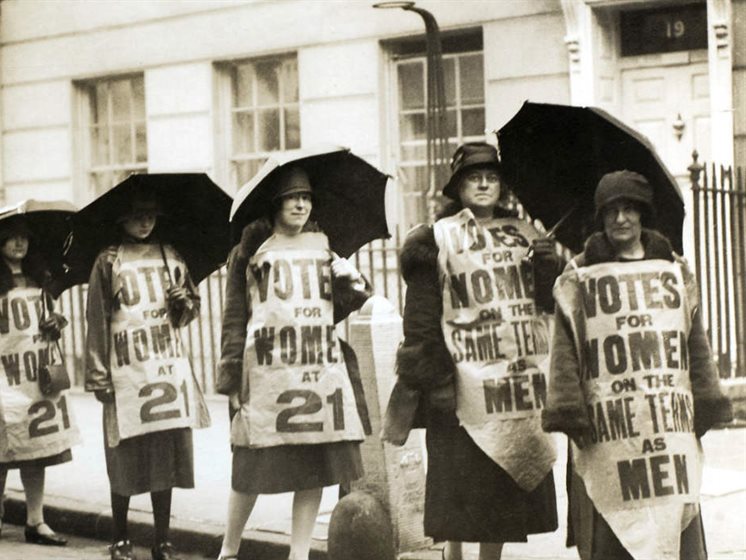 Rise Up Women! the remarkable lives of the suffragettes
Diane Atkinson talks about the campaign for the vote and new names that emerged from her research, which examines the contribution made by working-class women.
Rise Up Women! the remarkable lives of the suffragettes
Diane Atkinson talks about the campaign for the vote and new names that emerged from her research, which examines the contribution made by working-class women.
Who were the Suffrage Artists: lives revealed
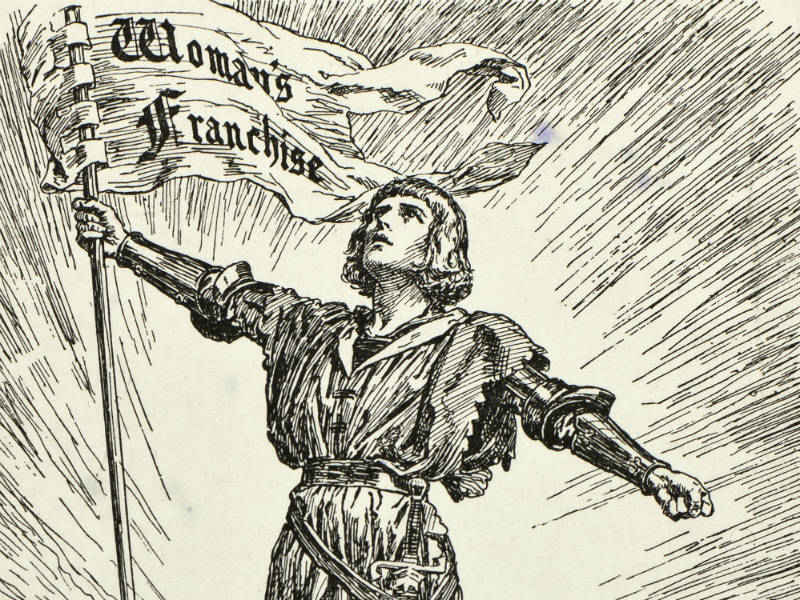 Who were the Suffrage Artists?
Elizabeth Crawford examines the iconography behind the campaign for suffrage.
Who were the Suffrage Artists?
Elizabeth Crawford examines the iconography behind the campaign for suffrage.
Indian Suffragettes: female identities and transnational networks
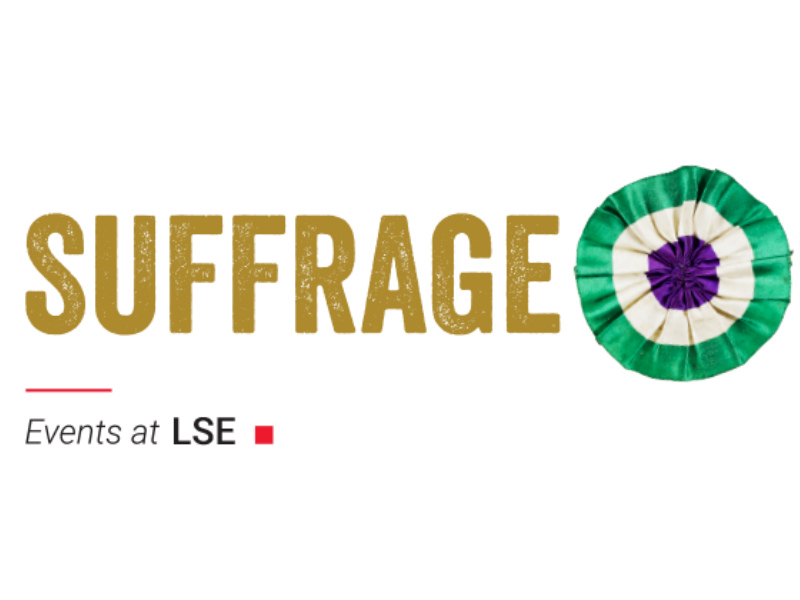 Sumita Mukherjee gives a talk about Indian Suffragettes, female identities and transnational networks
Sumita Mukherjee gives a talk about Indian Suffragettes, female identities and transnational networks
Sumita Mukherjee gives a talk about Indian Suffragettes, female identities and transnational networks
Sumita Mukherjee gives a talk about Indian Suffragettes, female identities and transnational networks
Online resources
These notes and powerpoint presentation are based on LSE Library’s At Last! Votes for Women exhibition, which concentrates on the campaign for women to have the vote from 1908 to 1918. They can be adapted for the Votes for Women topic in Key Stage 3 History and the development of the political system of government in Key stage 3 Citizenship. They can also be used as part of the Equality and Rights module in GCSE History AQA & OCR. They contain primary sources from the Women’s Library Collection.
All of the educational resources produced are open access under the terms of the Creative Commons Attribution-NonCommercial-ShareAlike 4.0 International (CC BY-NC-SA 4.0) License, which permits use, distribution and reproduction in any non-commercial medium, provided the original work is properly cited.
Talks
Our book talks included a variety of authors, all of whom had used material from the collection in their books. Jane Robinson on Hearts and Minds: the Suffragists March on London (11 January); Rachel Kolsky on Women's London (25 January); Helen Pankhurst on Deeds not Words (9 February); Diane Atkinson on Rise up women! (12 February); June Purvis on Christabel Pankhurst (15 February); Elizabeth Crawford on Suffrage Artists (23 March) and Sumita Mukherjee on Indian Suffragettes (22 May).
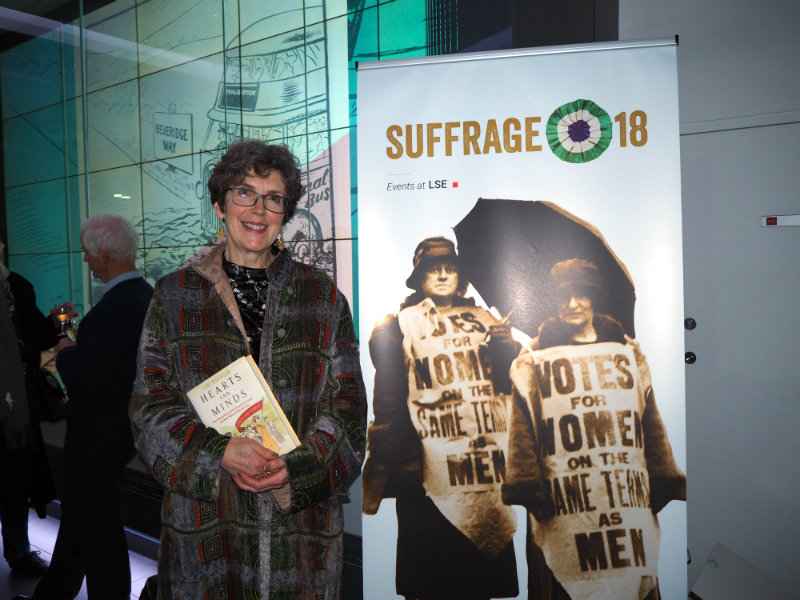 Jane Robinson at her talk on 11 January 2018.
Jane Robinson at her talk on 11 January 2018.
As part of OUTing the Past and LGBT+ History Month in February, Hilary McCollum gave a talk Sapphic Suffragettes (1 February). Kat Banyard lead a conversation on the global sex trade in Pimp State (10 May). In October, we collaborated with LSE EmbRACE for a panel discussion including Dawn Butler MP on Black Feminism: past, present and future (16 October). Rosie Fergusson gave a talk on Gingerbread: 100 years (25 October) and Zvezdana Popovic on The Story of the Scottish Women's Hospitals (9 November).
We hosted talks on screenings by Esther Johnson of Asunder (16 June) and Amanda Potter on the 1975 Wonder Woman pilot (26 June).
We finished the programme on 14 December, the centenary of the first general election in which some women voted, with a comedy evening Stand Up for Suffrage compered by Naomi Paxton with talks from Roz Ball, Hayley Kruger, Amara Thornton, Holly Parsons and Subhadra Das.
Activities
When the At Last! Votes for Women exhibition was on, we held a series of activities within the space including Suffragette Gaming (16 May), Justice Par-Tea for London History Day (31 May) and an EqualiTeas tea party (2 July).
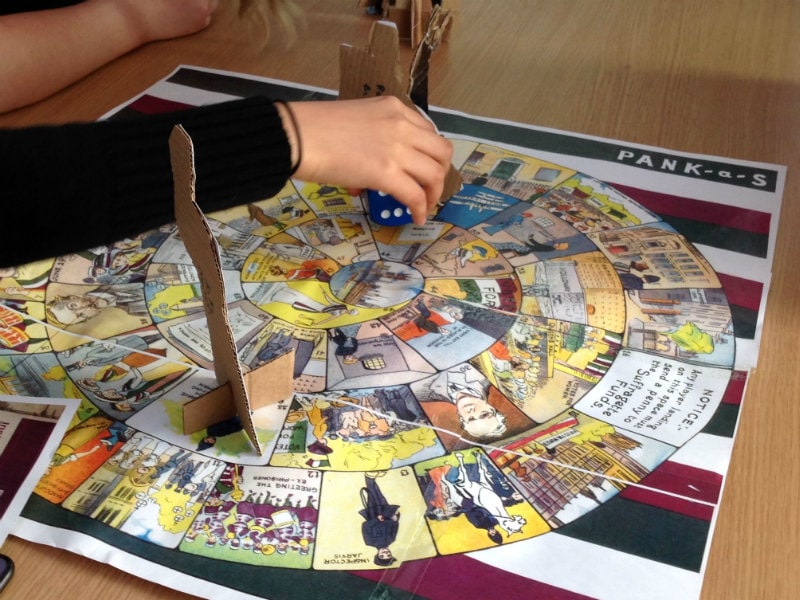 Suffragette gaming on 16 May.
Suffragette gaming on 16 May.
Art
In March, we invited We are Here, a collective of young BAME female artists, to respond to the themes of suffrage and identity to exhibit some of their work in the Library and hold a panel workshop. In addition, we held a seminar on Art and Suffrage (26 October); a display and walk around the sites of the victims of violence in Whitechapel (In) Memoriam Display by Ignite (1 to 5 November).
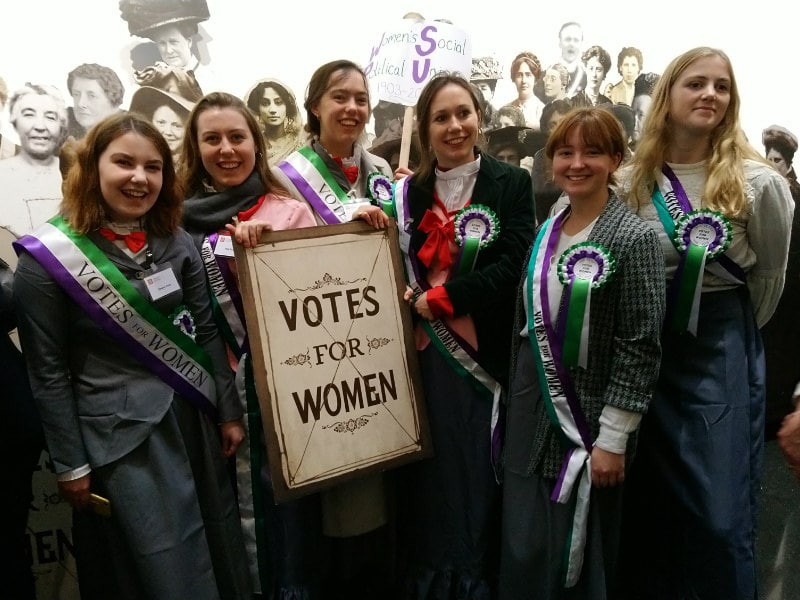 The launch of the naming of Pankhurst, Pethick-Lawrence & Fawcett Houses, November 2018.
The launch of the naming of Pankhurst, Pethick-Lawrence & Fawcett Houses, November 2018.
We exhibited the Mayor of London commissioned Make a Stand display of life-sized images of the women and men who fought for female suffrage (14 November to 14 December) in the Atrium Gallery, Old Building, LSE. This was the focus of the renaming ceremony for the Towers on Clement's Inn to Pankhurst, Fawcett and Pethick-Lawrence Houses.
Young People
We held a Q & A with author Sally Nichols on her book Things a Bright Girl Can Do (11 October) event with Tower Hamlets Archives at their Ideas Store as well as Women in Media Today: a masterclass with Samira Ahmed (21 November)
Performance
Lucy Stevens performed a recreation of the composer and suffragette Ethel Smyth's life and music in Grasp the Nettle! (4 July). Poet Natalie Scott presented her project in progress Rare Birds — Voices of Holloway Prison (25 July).
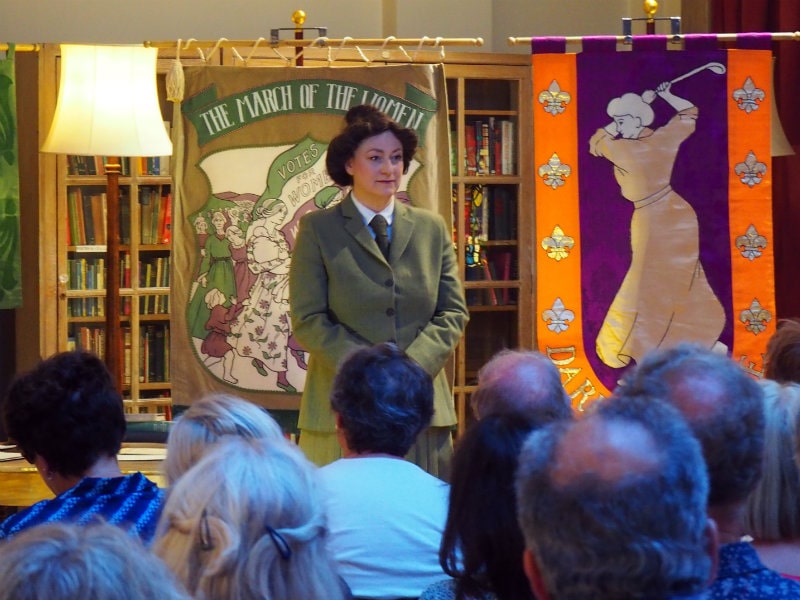 The March of the Women - Ethel Smyth
A performance by Lucy Stevens of The March of the Women by Ethel Smyth Lucy Stevens
The March of the Women - Ethel Smyth
A performance by Lucy Stevens of The March of the Women by Ethel Smyth Lucy Stevens
External projects
We supported a number of projects, such as:
LSE Women 1918 Banner
LSE’s Knitting Group were inspired to work together by our historic suffrage banners to create a new one commemorating all the women working at LSE when some women got the vote for the first time in 1918. The names of women at LSE in 1918 [DOC] have been compiled by LSE Archivist Sue Donnelly. The banner takes inspiration from the Old Building and the beaver incorporated into the banner was actually embroidered by Joan Lynas (Economic History) in the 1960s or 70s.
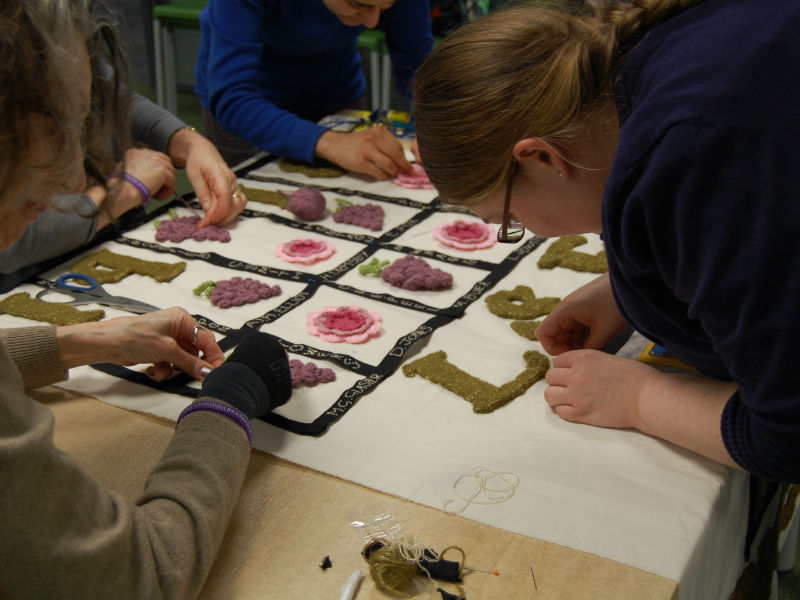 Some of the LSE Knitting Group members working on the banner.
Some of the LSE Knitting Group members working on the banner.
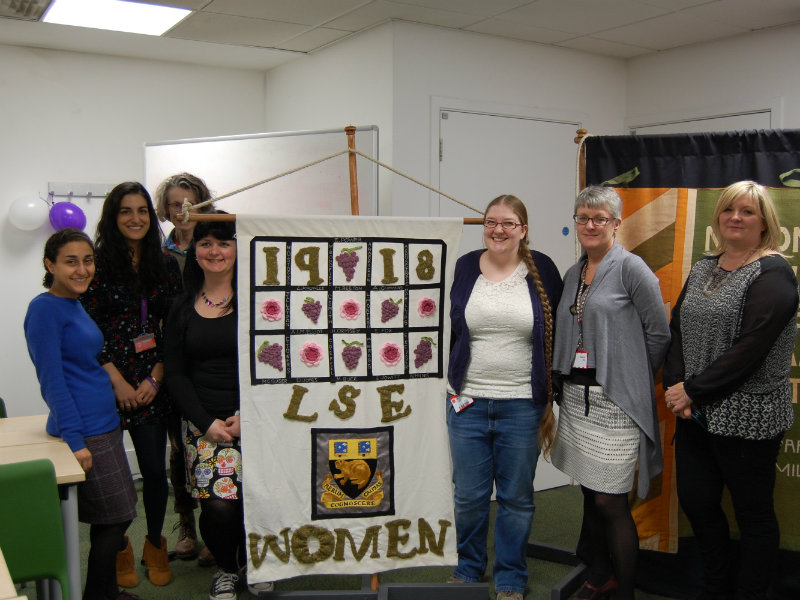 Some of the LSE Knitting Group with the completed banner.
Some of the LSE Knitting Group with the completed banner.
Collections
For more on our internationally significant collections relating to women’s suffrage go to our Women’s Suffrage webpage.
Contact
For any enquiries relating to Suffrage 18 – collections, teaching and research, exhibition, schools and events – please contact LSE Library:
For our opening times and visiting our archives please see our opening hours.
LSE Library, 10 Portugal Street, London WC2A 2HD. View LSE Library on Google Maps.